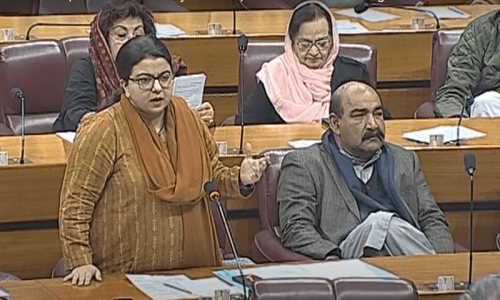KARACHI: Former Karachi mayor and leader of the Pak Sarzameen Party Mustafa Kamal demanded on Thursday an immediate ban on the Muttahida Qaumi Movement for being an “anti-state” organisation that allegedly had connections with the Indian intelligence agency RAW.
Speaking to reporters outside his DHA residence before leaving for Mirpurkhas, Mr Kamal referred to the allegations levelled by Shaharyar Khan Niazi, a Pakistani citizen and former deputy head of the British mission in Karachi, in his media interviews against MQM chief Altaf Hussain for having a formal agreement with RAW.
Mr Niazi himself believed that the alleged Indian connection of London-based Mr Hussain and the MQM as a political party in Pakistan were two different things as he said in one of the interviews: “It’s important to separate the MQM in Pakistan as a political party from Altaf Hussain and his team which managed relations with the Indian spy agency. There are many genuinely good people in the MQM who are doing a good job.”
However, Mr Kamal’s demand for a blanket ban on a party, which not only had a significant presence in parliament and the Sindh Assembly but also swept the local government elections in Karachi, Hyderabad and Mirpurkhas, appears to be a result of some failure to convince his former colleagues in the MQM to switch sides.
Since his March 3 return to the politics, Mr Kamal got support from less than a dozen, and mostly sidelined leaders, of the MQM, including three MPAs. And despite his repeated allegations against Mr Hussain, the MQM comfortably won the April 7 by-elections on NA-245 and PS-115 in Karachi.
The failure was evident from the severe criticism of senior MQM leader Dr Farooq Sattar for whom Mr Kamal had earlier claimed that he had great respect. “There is a limit to everything. Farooq Sattar should not force us to open our mouths ... he is the agent of an Indian agent,” he said in response to his recent criticism that the PSP enjoyed backing from elements in the establishment.
Mr Kamal added that what he said earlier about MQM-RAW nexus had been corroborated by government officials and now the former head of the British mission also confirmed that Mr Hussain had admitted his relationship with RAW in front of Scotland Yard. “Time has come for the state and its institutions to take a stand [against MQM].”
“If these allegations contain even five per cent of truth then why a party which is in contact with the intelligence agency of the enemy country is allowed to work freely in the country,” he said, adding: “The state should either ban such a party or make it clear that we are liars and file cases against us.”
Accompanied by Anis Kaimkhani and other PSP leaders, Mr Kamal appealed to the authorities to release the ‘missing’ workers of the MQM and accept their repentance, as the only man who got benefit from their disappearance was Altaf Hussain.
Later in the evening, he along with Mr Kaimkhani, Anis Advocate, Mohammad Raza, Dr Sagheer Ahmed and others reached Mirpurkhas to invite the people to the April 24 public meeting of the PSP at Karachi’s Bagh-i-Jinnah.
Published in Dawn, April 15th, 2016














































Dear visitor, the comments section is undergoing an overhaul and will return soon.